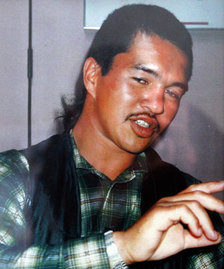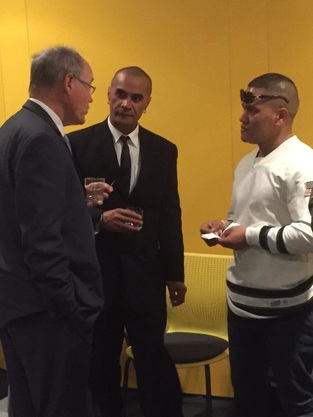 Christopher Crean: Killed for agreeing to testify against Black Power
Christopher Crean: Killed for agreeing to testify against Black Power In March 1996, a group of Black Power members had attacked a member of the Mongrel Mob outside Christopher Crean’s house in Taranaki. The incident was brutal. The Mob member’s face was slashed, and several of his fingers were severed with a tomahawk. Crean witnessed the attack and chose to testify against the attackers. Black Power threatened him and suggested that testifying would not be in his best interests. Police offered witness protection, but Crean refused it – a refusal which, while brave, ultimately proved fatal, as Black Power set about plotting his murder. Since 1988, Black Power members from the Taranaki region had twice beaten murder charges. Crown Prosecutor Tim Brewer felt that these cases helped convince the gang they were invincible. Crean, a street-preaching Christian, told his family that God would protect him. His family was less certain. His mother said: ‘I told him he was dealing with the real world, not the spiritual world. But he didn’t have any fear.’
Twice, on the last two Sundays of September 1996, the planned hit on Crean was abandoned – on the second of those nights, Crean was carrying his child and the would-be hit man felt compassion for the youngster. On 6 October, it was deemed that the hit would proceed regardless of circumstances. That night, a gunman carrying a 30-30 Winchester lever-action rifle approached Crean’s house and knocked on the door. As Crean went to answer, a shot was fired. The glass panel in the door offered little resistance and the bullet flew through it, entering Crean’s stomach and exiting out of his back. He died in hospital the next day. The use of a stomach shot was pre-planned as it was considered that a head shot through the door might miss. A Taranaki Black Power member said that the killing had sent a clear message to potential pros- ecution witnesses: ‘Oh, well they know now. Who . . . wants to get in the stand now?’ The implications of this killing for the justice process were plain: if the gang escaped penalty this time, future testimony against gangs would become increasingly difficult to obtain. The police moved quickly to bring closure to the case. Despite the seeming confidence that the killing would deter further wit- nesses, it was from within the gang that crucial evidence was to come. The New Plymouth chapter’s president and the gang prospect who drove the getaway car both gave evidence against their own gang. Four Black Power members were convicted of murdering Crean and given mandatory life sentences.
The fact that the Taranaki Black Power went after what in the gang scene is often referred to as a ‘baldhead’ or ‘citizen’ (meaning a person without gang or criminal associations) is highly unusual. In 2009, Crown Prosecutor Brewer confided:
At the time I was unaware of a precedent, and I’m not aware of one [other example] now. This guy [Crean] wasn’t in the gang milieu, he wasn’t in a gang, he was a bona fide member of the public – and it was a very big line for them to cross . . . they didn’t see themselves as the enemy of everybody – they saw themselves as the enemy of the police and the enemy of other gangs. This was stepping outside their ethos.
Most gang members limit their violence to other gangs or gang-associated people. Despite rhetoric about the pressing danger of gangs, ordinary people, or ‘citizens’, ordinarily have very little to fear from gang members, a view endorsed by Cam Stokes, former detective sergeant in charge of the police unit investigating outlaw motorcycle clubs in Auckland: ‘Indirectly they cause harm to many people [via the drug trade and associated problems], but in terms of direct things, no, not a great deal of risk, unless you are involved somehow with them.’
An undercover police officer who infiltrated gangs during two operations in the North Island agrees: ‘The only people who I think have got anything to fear from gangs are people who are intimately connected to them in some manner. They don’t give a toss about the other bal’ heads and squares . . . I mean, you know, who are they to the gang? Nobody.’ Another undercover police officer, when asked if gangs were a threat to the wider public, said:
No, no I don’t think so. But if you have a debt with them or you have done something to one of their family members or you are exceptionally wealthy [and in their circles] and you flaunt that and they see you as an easy target, then yes you do. But your “average Joe” blue collar worker who goes to work in a factory and goes home at night, no.
The fact that Black Power’s New Plymouth president testified in the trial against the killers of Christopher Crean is strong evidence that he, at least, considered the actions of his fellow gang members had crossed a line.
-----------------------------------
NOTE: All references for quotes etc can be found in Patched pp.201-203.



 RSS Feed
RSS Feed